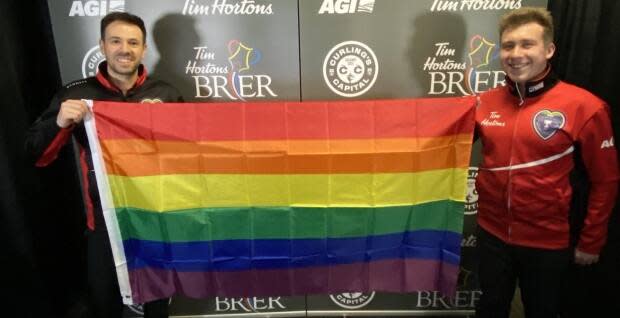After making Brier history, N.L. skip Greg Smith says LGBT representation in curling is crucial


When Greg Smith began curling as a child, he embarked on a journey of coming to terms with his own sexuality.
At the time, he said, the sport didn't have many openly gay athletes to look up to. Now, as Newfoundland and Labrador skip competes at the Canadian Curling mixed doubles tournament in Calgary, Smith says he hopes to be that representation for young LGBT Canadians.
Earlier this month, at the Brier, Smith faced off against Ontario's John Epping in what, while it may have looked like any other game, was a major curling milestone.
It was the first time two openly gay skips competed against one another in the Canadian men's championship. To mark the occasion, both Smith and Epping posed for a photo with a Pride flag after the match.
Smith, 24, told The St. John's Morning Show it was his first time playing against Epping, who he considers a great friend, and also a pivotal moment for representation in the sport.
"As a little boy growing up in curling — I started when I was eight — struggling for who I was as an individual, and coming to terms with my sexuality, I never had many people to look up to in sports," said Smith.
"Even though I'm not that old, there weren't a lot of people who were out and comfortable with that in the public eye, so it's really important to make sure that we were visible."
That kind of representation, Smith said, is still something that a lot of young LGBT athletes don't have, but is important, to show that everyone is capable of playing for the win.
"If I had seen somebody like myself on the TV, or in sports as a kid, I think that would have helped me come to terms with who I was, and make me realize everyone deserves to be at the highest seat in the table," he said.
Some negative reaction online
While Smith and Epping say they received a great amount of support from members of both the LGBT and the curling communities online, the moment hasn't been without some derogatory feedback.
"There was a bit of hate and ignorance that came along with it; some were not as vocal, and they would just leave a terrible Facebook comment on the post," Smith said. "But some on Twitter were quite nasty, and quite ignorant."
Smith said it shows that while society may have come a long way, there is still a considerable amount of work to be done to end intolerance.
"It really goes to show that we aren't in this utopia that a lot of people think that we are, in that discrimination against marginalized groups doesn't exist," said Smith. "It certainly does, and it is not much less prevalent than before."
Smith said he kept his sexuality closeted for nearly 18 years due in part to his faith, which he called a pivotal part of his life. But a lot of the hate comes from people's misinterpretation of scripture, he said.
If we can inspire the next generation to be more open, more kind, and more comfortable with who they are and who they were made to be, that's what matters. - Greg Smith
"I used my knowledge and my faith back at them, and I think that for a lot of people, their ignorance, and their hatred, and their misunderstanding of people is rooted in that [misinterpretation]," he said. "Others, sometimes they're homophobic and maybe they're struggling with their own journey."
Regardless of the negativity which they've received, Smith said, it's important to send a good message for those young fans and athletes watching.
"And if I can help, and I know John and anybody else who's open and authentic about who they are in this manner, if we can inspire the next generation to be more open, more kind, and more comfortable with who they are and who they were made to be, that's what matters."

